Biography
Tom Wesselmann (1931-2004)
Known for his Pop-Art nude figures–the Great American Nude Series– as well as collages, often with food themes, Tom Wesselmann is a Cincinnati born artist who studied at the Art Academy of Cincinnati and at Cooper Union in New York City in the late 1950s.
When he was a student at Cooper Union, he was much influenced by Abstract Expressionism, especially Willem de Kooning and Jackson Pollock. However, he turned away from that style because he determined these artists had become so introspective that there was little room for creative exploration by others.
His reaction took him to Pop Art, the other extreme of action painting to a tightly controlled style and subject matter that was mundane–the antithesis of psychological complexities. Joining a rebellion against the New York School, that which had become the establishment, he, like Andy Warhol and Wayne Thiebaud, asserted that everyday objects had significance unto themselves and that they were worthy of depiction because of a common understanding about what they were.
Of this reaction, Norman Geske of Sheldon Memorial Art Gallery wrote: “The swing of the pendulum was complete, from the esoteric to the commonplace, from passionate individualism to the popular language of the marketplace. The new point of view was not merely popular, it was ‘pop,’ assertive, declamatory, defiant, achieving a stylistic identity in the soup cans of Andy Warhol, the comic strips of Roy Lichtenstein, the billboards of James Rosenquist, and the domestic icons of Tom Wesselmann.”
In 1959, Wesselmann began his collages which showed influence of modernist artists ranging from Willem de Kooning and Henri Matisse. These collages were usually interior scenes with nude figures, a subject he did so repeatedly that it seemed an obsession. During the mid-1960s, he focused solely on female nudes, presenting them as sex objects with emphasis on breasts, mouth, and genitalia.

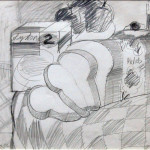 Study for Still Life no.19
Study for Still Life no.19
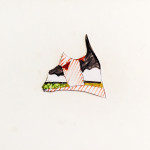 Drop in Seascape Sketch for Kate
Drop in Seascape Sketch for Kate
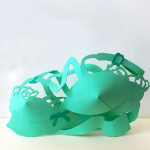 Tiny Dropped Bra # 1 (sold)
Tiny Dropped Bra # 1 (sold)
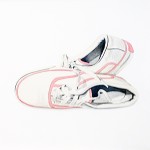 Sneakers (sold)
Sneakers (sold)
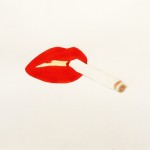 Study for Mouth number 11 (sold)
Study for Mouth number 11 (sold)
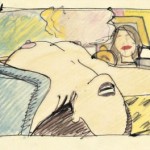 Drawing for Long Delayed Nude (sold)
Drawing for Long Delayed Nude (sold)
 Study for Still Life TV (sold)
Study for Still Life TV (sold)
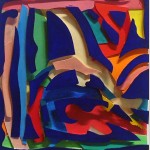 Maquette for Negative Blue Deep (sold)
Maquette for Negative Blue Deep (sold)